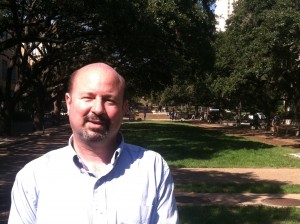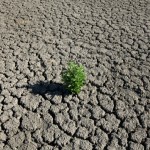In Texas, ‘Hot Weather’ is Becoming a Relative Concept

Photo by Mose Buchele
Mark Stimak says working in his BBQ trailor during the summer of 2011 was unbearable. This past summer was pretty hot too.
It’s the lunch rush on a warm November afternoon at the Hog Wild BBQ food trailer in Austin, and owner Mark Stimak says business is good. This time last year, he remembers, he was still recovering from the dry, hot summer. A summer that, in Austin, brought 90 days of triple-digit heat.
“It was just unbearable, I was always asking myself, ‘Why am I doing this business?'” he tells StateImpact Texas. “As a matter of fact, trailer food sales were way down that summer because people did not want to come out and sit outside.”
Compared to that experience, Stimak says working the barbecue pit this year was a cake walk. Not that this summer was particularly cool.
“Still, it was ridiculously hot,” he says. “We hit a hundred degrees a couple dozen times, I think.”
In fact, Austin hit triple digits 35 times this year. The average for the city is 13 times. And Austin was not unique. As Texans across the state comforted each other by observing ‘At least it’s not as bad as last year,’ 2012 was shaping up to be another one for the record books.
“As of right now, it’s the fourth warmest [year] on record for the state of Texas, through September,” Victor Murphy, with the National Weather Service, tells StateImpact Texas.
A lot of that has to do with above average temperatures last winter. But it’s also part of a warm spell that has engulfed the region over the last several years. Of the five warmest years on record in Texas, four have occurred since 2006.
“People are just getting normalized to it,” observes Stimak.
Lessons Learned, Lessons Forgotten
Extreme weather can serve as wake-up call if people feel they have some responsibility for it. Most recently, Hurricane Sandy re-injected the issue of global climate change into the U.S. presidential campaign, even prompting an 11th hour endorsement of President Barack Obama by New York Mayor Michael Bloomberg.

Photo by Mose Buchele
Professor Michael Mann is the Director of the Earth System Science Center at Penn State University and author of the famous "hockey stick" graph.
Before that, the drought and wildfires of the last two years, first in Texas and then in the Midwest, prompted some experts to hope that climate change would be taken more seriously by policymakers.
Dr. Michael Mann, Director of the Earth System Science Center at Penn State University says that hot spells have lead to government action in the past. He points to the European heat wave of 2003 as an example.
“That had a profound impact on the sort of public recognition that climate change wasn’t just a theoretical problem. It was something that was happening and it was having adverse effects,” Mann told StateImpact Texas in a recent interview.
But there’s another side to the coin: in Texas some people have simply stopped noticing unusually warm weather.
Texas State Climatologist John Nielsen-Gammon tells StateImpact Texas that that’s partially because the warming trend in Texas has been a long, slow process, despite the dramatic heat of recent summers.
“So what we consider to be normal now, wasn’t normal 30 years ago but yet still feels perfectly normal,” he says.
He says that ability to adapt might actually be a good thing for humans facing hotter summers, but only to a point.
“There are other parts of the environment that can’t acclimate,” says Neilsen-Gammon. “For example, the steadily increasing rate of evaporation from lakes and rivers has an impact on water supply. The warmer and drier conditions during the summer has an impact on plants.”
And more heat may be on tap for Texas.
The likelihood of plentiful rain over the winter is declining, increasing our chances of another hot, dry summer next year. It’s something that could have people looking back on the summer of 2012 as a cool one.

